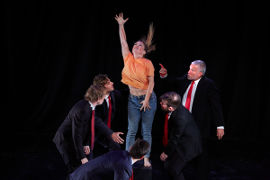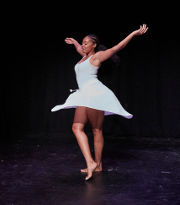
LYLE ANDREW MICHAEL
| A Daughter, a “WIFEY,” a Mother, a Woman
September
8-15, 2019 Trump most recently suggested the U.N. withdraw support for abortion. Where does that leave a woman -- the mother that could have been, or chose not to? What is the role of a woman when she becomes a significant other? Does she carry an expiration date?“WIFEY” tackles such poignant questions against the backdrop of the 2016 and upcoming 2020 elections. The experimental play written and directed by Sarah E -- attorney by day -- is evocative with potential for a ripple effect, be it in the realm of women’s or immigrant, or basic human, dignity.
There’s choreography in this drama -- presented at Theater for the New City as part of the Dream Up Festival -- in each scene, in the dialogue delivery, the actions, the interactions, and the message. Women will not, shall not, should not dance to any other’s tune but their own. “WIFEY” packs in a punch, from the opening vignette where the projected self of the lead character is spray-painted to symbolize the stamps placed upon her by her husband, family, friends, the justice system, and the administration, to a powerful scene where a weary her rests by candlelight on the bedroom floor. And the penultimate where it’s loud and clear that women will rise, to the denouement where a tranquil sight unfolds with meadows and floral prints. It includes minimalist set and costume design and inventive musical support in emotional piano excerpts, soothing lullabies, emphatic drumbeats and more. It’s certainly effective in the cosmos of the play and complimented with choreographed, static lighting.
With convincing performances by the cast, inclusive of Jessica Soares as the conflicted lead, Frank Halbiger as the wavering husband, Julienne Jones as the despaired self, Tee Sudderth as the God-fearing mother, the message is clear: women at different stages in their life are expected to conform. In response, you have aggression on several levels and united voices shouting, “Donald Trump has got to go,” as well as “Fuck Trump, immigrants are welcome here,” on a related note of oppression. Whether it’s the anticipation of that diamond on the finger or the body image she must adhere to, whether the pay check she brings home or the grandkids she must produce within her biological time frame, whether her rights to pro-life or abortion are without conditions or her ideal of love and happy-ever-after is fantasy, a woman is never just herself. A woman is everyone before and after her. A wife is a significant phase in a woman’s life, and this is where“WIFEY” branches out to portray the hardships she faces and the chains she is shackled with. Emotions, humor, and full-frontal female and male nudity are tools implemented in structured measure. Take the scene where the lead husband wakes up naked and burps and scratches his groin while the wife looks on in disgust, or another between mother and daughter discussing micro aggression and #MeToo, while sipping their white wine, and the latter exiting in frustration and contempt for her mother’s perceived derogatory behavior. Or let’s look at one where the roles are reversed, in which an old couple is shown dealing with the woman’s dementia and the husband gently does her hair and hides every frequent cup of coffee she makes for him just so he doesn’t upset her. As for final scene -- of a young girl in a meadow picturing a life filled with joy, peace and love -- it’s a tad too idyllic, especially post the hard-hitting tableau of societal and cultural complications of being a woman. With that less-dramatic bit, “WIFEY” ends on a subtle note, perhaps a hopeful one. |
| museums | NYTW mail | recordings | coupons | publications | classified |



